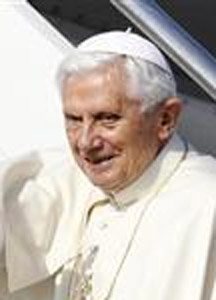ABOARD THE PAPAL PLANE, (Reuters) – Pope Benedict said yesterday communism no longer works in Cuba and that the Roman Catholic Church was ready to help the island find new ways of moving forward without “trauma.”

Speaking on the plane taking him from Rome for a five-day trip to Mexico and Cuba, the pope told reporters: “Today it is evident that Marxist ideology in the way it was conceived no longer corresponds to reality.”
Responding to a question about his visit to the island, a communist bastion off the coast of the United States for more than 50 years, Benedict added: “In this way we can no longer respond and build a society. New models must be found with patience and in a constructive way.”
Benedict offered the help of the Church in achieving a peaceful transition on the island, saying the process required patience but also “much decisiveness.”
“We want to help in a spirit of dialogue to avoid traumas and to help move forward a society which is fraternal and just, which is what we desire for the whole world,” the pope added.
His comments drew a cautious response from Cuba’s government.
“We will listen with all respect to his Holiness,” said Cuban Foreign Minister Bruno Rodriguez, speaking at a press conference in Havana shortly after the pope’s comments.
“We respect all opinions. We consider useful the exchange of ideas,” he added, noting however that “our people have deep convictions developed over our country’s long history.”
Benedict’s comments about communism were more pointed and critical than anything John Paul II said on his groundbreaking visit to Cuba 14 years ago.
John Paul is best remembered in Cuba for his conciliatory words at a Mass in Havana’s vast Revolution Plaza: “May Cuba, with all its magnificent potential, open itself up to the world, and may the world open itself up to Cuba.”
That visit accelerated a process of reconciliation between the Church and Cuba’s communist rulers who were at odds for many years following the 1959 Cuban revolution.
Benedict said the 1998 visit by his predecessor “opened up a path of collaboration and constructive dialogue, a road that is long and calls for patience, but moves forward.”
Despite improved church-state relations in recent years the Cuban bishops and the government are still at odds over issues such as church use of the media and religious education.
The church is especially concerned about the potential for social upheaval if broader reforms are not implemented in Cuba soon.
The word “trauma” has been used by Catholic church leaders to refer to what may happen in Cuba, particularly after the death of ailing revolutionary leader Fidel Castro, 85, who handed over power to his brother Raul in 2008.
Cuba’s leaders have repeatedly recognized that the country’s economic model need improvements to meet the needs of its citizens, though they staunchly defend the island’s one-party communist-run political system. In 2010, Fidel Castro told a reporter for the Atlantic magazine that the “Cuban model doesn’t even work for us any more,” which some commentators interpreted as a recognition that communism had failed in Cuba.
Castro later clarified the remark saying it was not meant as any criticism of Cuba’s communist revolution, and was instead directed at the island’s difficult economic conditions.
The comment appeared to reflect Castro’s agreement with a series of modest reforms to stimulate Cuba’s troubled economy initiated by his younger brother, Raul Castro.
HUMAN RIGHTS
Asked by reporters on his plane about whether he should defend human rights in Cuba, Pope Benedict replied: “It is obvious that the Church is always on the side of freedom, on the side of freedom of conscience, of freedom of religion, and we contribute in this sense.”
In a report published on Thursday, the human rights group Amnesty International said harassment and detention of dissidents in Cuba had risen sharply over the last two years.
“Cuba has seen worsening repression when it comes to human rights. What we want to see happening is for activists to be able to carry out their legitimate work without the fear of reprisals,” said Gerardo Ducas, Amnesty’s Cuba researcher.
On Monday, Cuba released 70 members of the dissident Ladies in White group detained during the weekend but warned them not to attend activities related to the pope’s visit.
The women, known in Spanish as the “Damas de Blanco,” were freed without charges after being arrested in three separate incidents on Saturday and Sunday when they attempted to march in Havana.
There are no meetings with Cuban dissidents on the pope’s program. Last week the Vatican re-stated its condemnation of the U.S. trade embargo against Cuba, calling it useless and something that hurts ordinary people.





